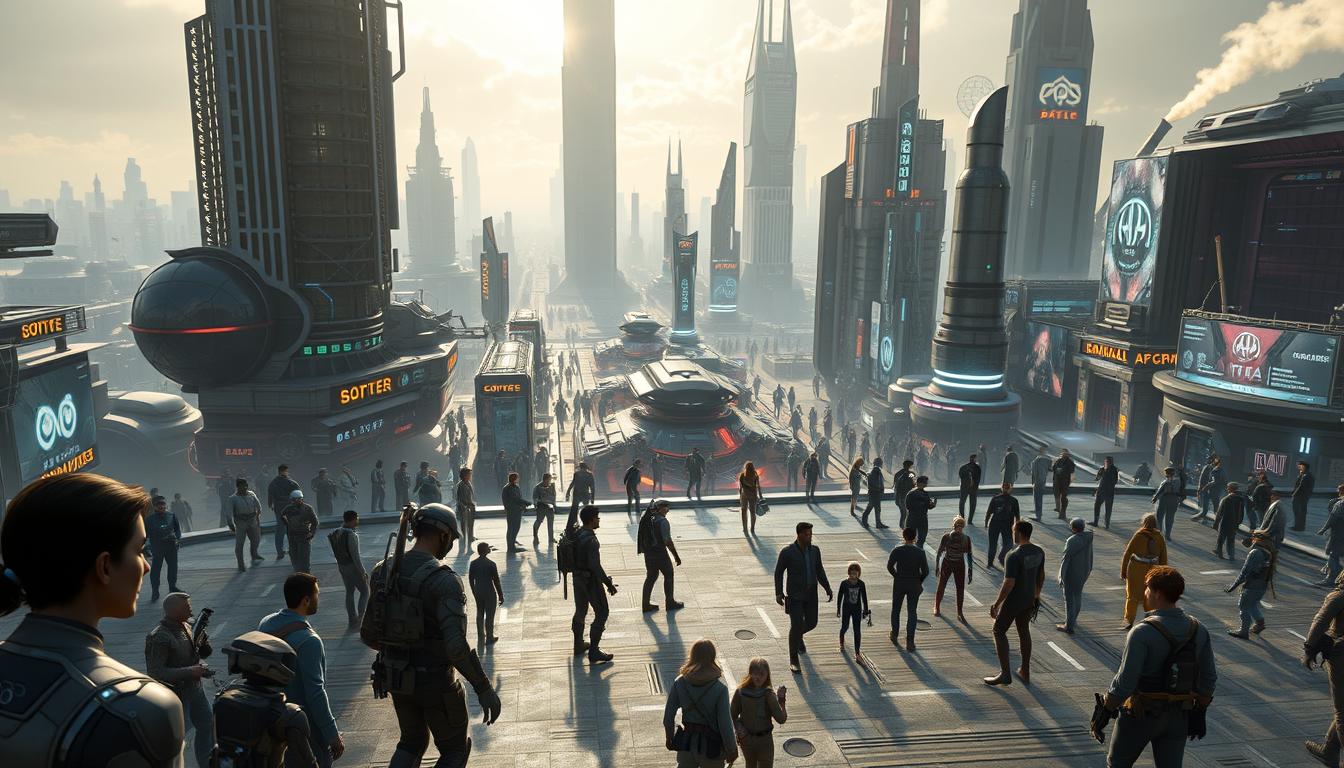The gaming industry is on the cusp of a revolution, driven by the integration of AI NPCs that are transforming the way we experience games.
Gone are the days of predictable, scripted interactions. With AI NPCs, game characters can now adapt, learn, and respond to player actions in a more human-like way, creating a more immersive experience.
This shift is not just about enhancing gameplay; it’s about redefining the future of gaming. As we explore the impact of AI NPCs, we’ll delve into how they’re changing the landscape of the gaming industry.
Key Takeaways
- AI NPCs are revolutionizing the gaming industry with adaptive and human-like interactions.
- The integration of AI NPCs enhances gameplay and player experience.
- The future of gaming is being shaped by the capabilities of AI NPCs.
- Developers are leveraging AI NPCs to create more realistic game environments.
- Players can expect more immersive and dynamic gaming experiences.
The Evolution of NPCs in Gaming History
The history of NPCs in gaming is a story of rapid evolution, transforming from simple characters to complex entities. This transformation has been driven by advancements in technology and game design.
From Static Scripts to Dynamic Characters
Early NPCs were bound by static scripts, limiting their interactions to pre-defined actions. Modern NPCs, however, utilize AI-powered technologies to exhibit dynamic behaviors, making the gaming experience more immersive.
Key Milestones in NPC Development
Several key milestones have marked the development of NPCs, including the introduction of behavioral trees and machine learning algorithms. These advancements have enabled NPCs to adapt to player actions and create a more engaging experience.
Understanding AI-Powered NPCs
With the advent of AI, NPCs have evolved from static characters to dynamic entities that can adapt and respond to player actions. This transformation is largely due to advancements in machine learning and neural networks, which enable NPCs to learn from interactions and adjust their behaviors accordingly.
What Makes AI NPCs Different
AI NPCs differ significantly from their traditional counterparts in their ability to dynamically respond to player actions. Unlike scripted NPCs, AI-powered characters can learn and adapt, providing a more immersive gaming experience. Key differences include:
- Adaptive Behavior: AI NPCs can change their actions based on player decisions.
- Complex Decision Making: Utilizing neural networks, AI NPCs can make more nuanced decisions.
- Enhanced Realism: AI NPCs can simulate human-like behavior, making the game world feel more alive.
Core Technologies Behind AI NPCs
The development of AI NPCs relies on several core technologies, primarily neural networks and procedural generation systems.
Neural Networks and Deep Learning
Neural networks are crucial for enabling AI NPCs to learn from data and improve their decision-making processes. Through deep learning, NPCs can analyze complex patterns and respond appropriately.
Procedural Generation Systems
Procedural generation allows for the creation of dynamic content, such as environments and NPC behaviors, on the fly. This technology ensures that each player’s experience is unique and engaging.
By combining these technologies, game developers can create AI NPCs that offer richer, more interactive experiences. As AI continues to evolve, we can expect NPCs to become even more sophisticated, further enhancing the gaming landscape.
How AI NPCs Are Changing the Future of Gaming
With AI NPCs, the gaming landscape is evolving to include more dynamic and engaging player interactions. The incorporation of AI into NPCs is not just a technological advancement; it’s a gateway to creating richer, more immersive gaming experiences.
Transforming Player-NPC Interactions
AI NPCs are revolutionizing how players interact with game characters. Unlike traditional NPCs that follow pre-scripted paths, AI NPCs can adapt to player behavior, offering a more personalized experience. This adaptability leads to more complex and realistic interactions, enhancing the overall gameplay.
For instance, in games where NPCs are powered by advanced AI, players can engage in conversations that feel more natural and responsive. The NPCs can understand context and respond accordingly, making the interaction feel more like a dialogue with a real character.
Creating More Immersive Gaming Worlds
AI NPCs are also pivotal in creating more immersive gaming worlds. By enabling NPCs to have their own agendas, behaviors, and emotions, game developers can craft environments that feel alive and responsive to the player’s actions. This not only enhances the visual and interactive aspects of the game but also deepens the player’s emotional investment.
The impact of AI NPCs on the future of gaming can be seen in several key areas, including the enhancement of player experience and the creation of more immersive game worlds. As AI technology continues to evolve, we can expect to see even more innovative applications in game development.
| Feature | Traditional NPCs | AI NPCs |
|---|---|---|
| Interaction | Pre-scripted responses | Dynamic, adaptive responses |
| Behavior | Predictable patterns | Complex, realistic behaviors |
| Immersion | Limited emotional engagement | Deep emotional investment |
Machine Learning Techniques Revolutionizing NPC Behavior
Machine learning is revolutionizing NPC behavior, making gaming experiences more immersive and interactive. This transformation is primarily driven by two key technologies: reinforcement learning and natural language processing.
Reinforcement Learning in NPC Decision Making
Reinforcement learning enables NPCs to learn from their environment and make decisions based on rewards or penalties. This technique allows NPCs to adapt their behavior, creating a more dynamic and responsive gaming experience.
- NPCs can adapt to different player strategies.
- They can learn from their mistakes and improve over time.
- Reinforcement learning enables more realistic NPC behavior.
Natural Language Processing for Realistic Dialogue
Natural Language Processing (NLP) is another crucial technology enhancing NPC behavior. NLP allows NPCs to understand and respond to player inputs in a more natural and intuitive way.
Key benefits of NLP in NPCs include:
- More realistic and varied dialogue options.
- Improved player-NPC interactions.
- Enhanced immersion through contextual conversations.
Groundbreaking Games Showcasing Advanced AI NPCs
Advanced AI NPCs have become a hallmark of modern gaming, with several titles leading the charge. These games have not only pushed the boundaries of what is possible with AI in gaming but have also set new standards for player interaction and immersion.
Red Dead Redemption 2 and Dynamic NPC Ecosystems
Red Dead Redemption 2 is a prime example of a game that has leveraged advanced AI NPCs to create a more realistic and engaging gaming experience. The game’s NPCs have complex daily routines, respond to player actions, and interact with each other in sophisticated ways, creating a dynamic ecosystem that enhances the game’s open-world feel.
The Last of Us Part II’s Adaptive Enemies
The Last of Us Part II features AI NPCs that are highly adaptive, making the combat more challenging and realistic. Enemies in the game use advanced tactics, communicate with each other, and adjust their behavior based on the player’s actions, providing a more immersive and intense gaming experience.
Shadow of Mordor’s Nemesis System
Shadow of Mordor introduced the Nemesis System, a groundbreaking AI NPC system that allows orcs to remember their encounters with the player. This system creates a personalized experience where NPCs develop their own personalities, rivalries, and histories based on their interactions with the player, adding depth and replayability to the game.
These games demonstrate the potential of advanced AI NPCs in creating more engaging, realistic, and immersive gaming experiences. As AI technology continues to evolve, we can expect to see even more innovative applications in future games.
The Impact of AI NPCs on Game Design
With AI-driven NPCs, game designers can now craft richer, more responsive worlds that enhance player engagement. The incorporation of AI NPCs is significantly influencing game design, allowing for more sophisticated and dynamic interactions within the game world.
Shifting Development Priorities
The introduction of AI NPCs is reshaping development priorities in game design. Developers are now focusing on creating more complex behaviors and interactions for NPCs, which requires a shift in resource allocation and planning. This change is driven by the potential for AI NPCs to create more immersive and engaging experiences.
| Development Aspect | Traditional NPCs | AI NPCs |
|---|---|---|
| Behavior Complexity | Limited, scripted behaviors | Dynamic, adaptive behaviors |
| Player Interaction | Predictable responses | Variable, context-dependent responses |
| Development Focus | Scripting and level design | AI behavior development and tuning |
Emergent Gameplay Possibilities
AI NPCs enable emergent gameplay possibilities by creating environments where player actions have meaningful, unpredictable consequences. This leads to a more engaging and replayable experience, as players can experiment with different approaches and see varied outcomes.

The potential for AI NPCs to revolutionize game design is vast, offering new avenues for creativity and innovation in the gaming industry.
Player Experience: How AI NPCs Enhance Immersion
With the advent of AI NPCs, game developers can now create more immersive and personalized gaming experiences. This advancement is significantly enhancing the player experience, making games feel more realistic and engaging.
Emotional Connections with Digital Characters
AI NPCs are capable of forming emotional connections with players, making the gaming experience more impactful. By adapting to player behavior, these characters can create a sense of empathy and understanding, drawing players deeper into the game world.
Personalized Gaming Experiences
Personalization is a key benefit of AI NPCs, allowing games to adapt to individual player styles. This results in a more engaging experience, as the game world and its characters respond dynamically to the player’s actions.
Adaptive Difficulty and Learning Curves
One of the ways AI NPCs personalize the gaming experience is through adaptive difficulty. By adjusting the challenge level based on player performance, these NPCs ensure that the game remains engaging but not overwhelming.
Memory-Based Character Relationships
AI NPCs can also develop memory-based character relationships, remembering past interactions with the player and altering their behavior accordingly. This adds a layer of depth to the game, making the player’s actions have lasting consequences.
By incorporating these advanced features, AI NPCs are revolutionizing the gaming industry, offering players a more immersive, personalized, and engaging experience.
Challenges and Limitations of Current AI NPC Technology
Despite the progress made in AI NPC technology, several technical and design challenges remain to be addressed. The complexity of creating sophisticated AI NPCs that can interact realistically with players is a significant hurdle.
Technical Constraints and Computing Requirements
One of the primary challenges is the technical constraint imposed by current computing hardware. Advanced AI NPCs require substantial processing power to handle complex decision-making processes and interactions in real-time. This can lead to increased latency and decreased overall game performance if not managed efficiently.
The table below highlights some of the key technical constraints and their impact on AI NPC development:
| Technical Constraint | Impact on AI NPCs |
|---|---|
| Processing Power | Limited ability to handle complex AI behaviors |
| Memory Capacity | Restrictions on the amount of data AI NPCs can process |
| Algorithm Efficiency | Affects the realism and responsiveness of AI NPC interactions |
Balancing Realism with Entertainment Value
Another significant challenge is striking a balance between realism and entertainment value. While highly realistic AI NPCs can enhance the gaming experience, they can also make the game more difficult or less enjoyable if not balanced correctly.
Developers must carefully calibrate AI NPC behaviors to ensure they are engaging and challenging yet not overwhelming. This requires a deep understanding of player psychology and game design principles.
Player Reception and Community Response to AI NPCs
The introduction of AI NPCs has revolutionized the gaming landscape, eliciting varied responses from players and the broader gaming community. As these advanced characters become more integrated into games, understanding the community’s reaction is crucial.
Success Stories and Player Testimonials
Many players have praised the enhanced immersion and realism AI NPCs bring to their gaming experiences. For instance, games like Red Dead Redemption 2 have received accolades for their sophisticated NPC behaviors, making the game world feel more alive and responsive.
Some players have shared their positive experiences on forums and social media, highlighting how AI NPCs have improved their engagement with the game. A table summarizing player feedback on AI NPCs in various games is shown below.
| Game Title | Player Feedback on AI NPCs |
|---|---|
| Red Dead Redemption 2 | High praise for realistic behaviors and interactions |
| The Last of Us Part II | Appreciation for adaptive enemy AI, enhancing challenge and realism |
| Shadow of Mordor | Positive feedback on the Nemesis System, creating personalized enemy experiences |
Criticisms and Controversies
Not all player feedback has been positive. Some critics argue that AI NPCs can sometimes behave unpredictably, leading to frustrating gameplay experiences. Others have raised concerns about the potential for AI-driven characters to make games feel less scripted and more repetitive.

Despite these criticisms, the overall trend suggests that the benefits of AI NPCs, such as enhanced immersion and dynamic gameplay, are appreciated by a significant portion of the gaming community.
Ethical Considerations in AI NPC Development
The integration of AI in NPCs brings forth significant ethical considerations. As AI NPCs become more advanced, they raise important questions about their impact on players and the gaming community.
Representation and Bias in AI Characters
One of the key ethical concerns is the representation and potential bias in AI characters. AI NPCs are created based on data, which can sometimes reflect existing biases. For instance, if the training data contains stereotypes or prejudiced content, the AI NPCs may perpetuate these biases, potentially offending or alienating players.
| Potential Bias | Impact on Players | Mitigation Strategy |
|---|---|---|
| Stereotypical character designs | Offend or alienate players | Diverse and inclusive data sets |
| Prejudiced dialogue or behavior | Negative player experience | Regular audits and testing for bias |
Privacy Concerns with Adaptive NPCs
Adaptive AI NPCs, which adjust their behavior based on player interactions, raise privacy concerns. These NPCs often require access to player data to function effectively, potentially infringing on player privacy. Ensuring that player data is handled responsibly and securely is crucial.
By acknowledging these ethical considerations, game developers can work towards creating more responsible and player-centric AI NPCs.
The Future Landscape of Gaming with Advanced AI NPCs
Advanced AI NPCs are on the cusp of transforming the gaming landscape in unprecedented ways. As technology continues to evolve, the integration of AI in gaming is expected to reach new heights, offering players more immersive and interactive experiences.
Emerging Technologies on the Horizon
The future of gaming will be shaped by several emerging technologies that promise to enhance AI NPC capabilities. Two significant advancements in this area are quantum computing and brain-computer interfaces.
Quantum Computing Applications
Quantum computing has the potential to revolutionize AI NPC behavior by enabling more complex decision-making processes. This technology could lead to NPCs that adapt and respond in highly sophisticated ways, creating a more realistic gaming experience.
Brain-Computer Interfaces
Brain-computer interfaces (BCIs) represent another frontier in AI NPC development. By allowing players to control games with their thoughts, BCIs could create a new level of interaction between players and NPCs, further blurring the line between the virtual and real worlds.
Predictions from Industry Leaders
Industry leaders are optimistic about the future of AI NPCs. According to recent statements, the next generation of games will feature NPCs with advanced emotional intelligence and adaptive behaviors. For instance, a table highlighting key predictions is shown below:
| Prediction | Description | Impact |
|---|---|---|
| Advanced Emotional Intelligence | NPCs will be able to understand and respond to player emotions. | More immersive gameplay |
| Adaptive Behaviors | NPCs will adapt their actions based on player behavior. | Increased replayability |
| Enhanced Realism | NPCs will exhibit more realistic behaviors and interactions. | Better player engagement |
As these technologies continue to develop, we can expect the future of gaming to be shaped by more sophisticated AI NPCs, leading to richer and more engaging gaming experiences.
Conclusion
As we’ve explored throughout this article, AI NPCs are transforming the gaming landscape. From their evolution and core technologies to their impact on game design and player experience, AI NPCs are redefining the boundaries of immersive gaming.
The integration of AI NPCs in gaming has opened up new possibilities for dynamic storytelling, personalized experiences, and realistic interactions. With advancements in machine learning and natural language processing, AI NPCs are becoming increasingly sophisticated, enabling gamers to form emotional connections with digital characters.
As the gaming industry continues to adopt AI NPC technology, we can expect to see even more innovative applications in the future. Industry leaders predict that AI NPCs will play a crucial role in shaping the future of gaming, enabling the creation of more complex, dynamic, and engaging game worlds.
The potential of AI NPCs to revolutionize gaming is vast, and we can expect to see significant advancements in the years to come. As AI NPCs continue to evolve, they will undoubtedly play a key role in defining the future of gaming.
FAQ
What are AI NPCs and how do they differ from traditional NPCs?
AI NPCs, or Artificial Intelligence Non-Player Characters, are characters in games that use advanced AI technologies to behave in a more realistic and dynamic way, unlike traditional NPCs that follow pre-programmed scripts.
How are AI NPCs changing the gaming industry?
AI NPCs are revolutionizing the gaming industry by enabling more immersive and engaging gameplay experiences, creating more realistic interactions between players and NPCs, and allowing for more dynamic game worlds.
What technologies are used to create AI NPCs?
AI NPCs are created using a range of technologies, including neural networks, deep learning, and procedural generation systems, which enable more sophisticated NPC behaviors and interactions.
Can you give examples of games that have successfully implemented AI NPCs?
Games like Red Dead Redemption 2, The Last of Us Part II, and Shadow of Mordor have showcased advanced AI NPCs, featuring complex behaviors and interactions that enhance the gaming experience.
What are the challenges and limitations of developing AI NPCs?
Developing AI NPCs poses several challenges, including technical constraints, balancing realism with entertainment value, and addressing ethical considerations such as representation and bias.
How do AI NPCs impact the player experience?
AI NPCs can create more emotional connections with digital characters, enable personalized gaming experiences, and foster a more immersive game environment through adaptive difficulty and memory-based character relationships.
What does the future hold for AI NPCs in gaming?
The future of AI NPCs in gaming is promising, with emerging technologies like quantum computing and brain-computer interfaces on the horizon, and industry leaders predicting significant advancements in AI NPC technology.




